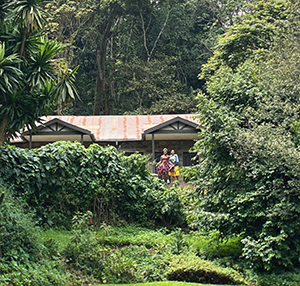
While immersed in Kenya’s multidimensional culture, I became struck by the vast contrast between the Kenyan people’s harmonious relationship with their land and the destructive tendencies of individualistic societies worldwide. In an era of rising radical individualism, I discovered that the insatiable desires of the human psyche stem from the fear of loss – the more we acquire, the more we fear losing. This concept resonated deeply within me throughout my journey. The hope is that much of what we need is already within our reach, and that contentment will grant us peace.
In Kenya, sustainability and land preservation are not just policies or mere efforts but an integral part of the culture. The people’s love for their land is palpable, and we must reclaim this sense of responsibility.
During a panel discussion with representatives from non-governmental organizations, I met Billy Mugambi, a Program Designer at EDU Africa. He emphasized the importance of restoration and land preservation, inspiring me to ask him how we can return to the abandoned art of preserving the environment.
“How much of a parasite one can be with a single point of view,” Mugambi said, a response that resonated.
The individualistic viewpoint has led us to virtually abandon indigenous knowledge and community work. In the words of Wangari Maathai, the renowned Kenyan environmentalist and first African to win the Nobel Peace Prize for her environmental work, “The destruction of the environment is a result of the destruction of the cultural heritage of the people.” Maathai narrates in her book “Unbowed” how people used to carry sisal bags made of natural fibers, which were later replaced by plastic bags. Consequently, the plastic bag ban in Kenya implemented in 2017, made a significant 80% reduction in plastic waste. Nevertheless, this success underlines the need to reclaim indigenous practices lost to colonization and modernization.
Reflecting on this concept, I am reminded of the direct contrast between traditional ways and modern life in the US. We’ve traded birdsong for air-polluting trucks and lush forests for deforestation marks. This contrast underlines the importance of reviving indigenous knowledge and practices for environmental and communal harmony.
To maintain a healthy connection with the land, we must incorporate indigenous wisdom into our educational institutions, emphasizing shared accountability, community, and traditional methods that align with the environment. Breaking down individualism is essential for fostering a culture of sharing, collaboration and interconnectedness. As Billy said, “Either we work together, or we perish together.”
My experience studying abroad highlighted the importance of collective responsibility. The Kenyan people’s connection to their land and heritage highlights the power of Indigenous knowledge applied. Together, we can establish a sustainable future by restoring Indigenous knowledge and effectively embedding it into educational systems.
With the spirit of Harambee, a Swahili word that means “let’s unite,” we can approach our communities with the action to foster environmental growth and cultivate a harmonious relationship with all creation, therefore, ensuring a flourishing planet for generations to come.
Partner With Us
The Institute for Sustainability Africa (INŚAF) is an independent multi-disciplinary think tank and research institute founded in Zimbabwe in 2010 with the Vision to advance sustainability initiatives for Africa.




